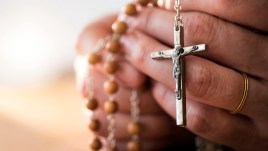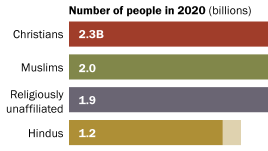
How religious is your state?
Explore our interactive database to find out how religious adults are in your state based on service attendance, prayer, belief in God, and importance of religion.
Numbers, Facts and Trends Shaping Your World
Explore our interactive database to find out how religious adults are in your state based on service attendance, prayer, belief in God, and importance of religion.
All
Publications
As Canadians prepare to celebrate Canada Day on July 1, a new Pew Research Center analysis of Canadian census and survey data finds that more Canadians belong to minority faiths than ever before. In addition, the number of Canadians with no religious affiliation has been rising, and attendance at religious services has been dropping.
Pew Research’s fourth major report on global restrictions on religion finds that the share of countries with high or very high restrictions on religion rose from 37% in 2010 to 40% in 2011. The Middle East and North Africa continued to have the highest levels of restrictions in the year when much of the Arab Spring uprisings occurred, with social hostilities involving religion increasing markedly and government restrictions remaining high.
Explore the relationship between a country’s acceptance of homosexuality and its religiosity in this interactive.
Nearly half of U.S. adults are connected to Catholicism. Read about going to Mass, Communion, confession and more.
Christians remain the largest religious group, and Muslims grew the fastest from 2010 to 2020. Read how the global share of Buddhists, Hindus, Jews and the religiously unaffiliated changed.
After years of decline, the U.S. Christian share now shows signs of leveling off. The new Religious Landscape Study explores trends in identity, beliefs and practices.
The Global Religious Futures (GRF) project is jointly funded by The Pew Charitable Trusts and The John Templeton Foundation. Here are some big-picture findings from the GRF, together with context from other Pew Research Center studies.





